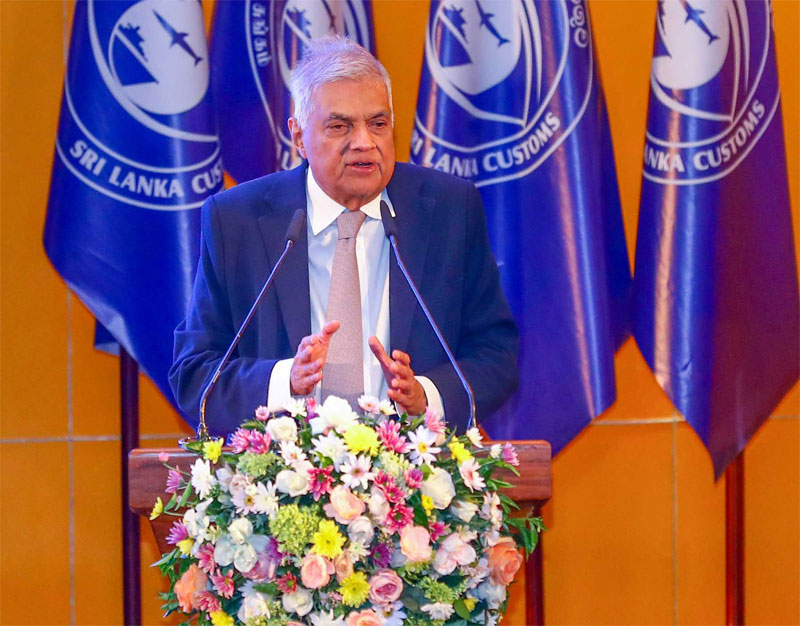Monday Feb 16, 2026
Monday Feb 16, 2026
Saturday, 27 January 2024 02:25 - - {{hitsCtrl.values.hits}}

President Ranil Wickremesinghe
Amidst widespread criticism over the International Monetary Fund-influenced policies the President Ranil Wickremesinghe yesterday invited alternative proposals if any from political parties for consideration by the multilateral lending organisation on its program in Sri Lanka.
Speaking at the International Customs Day celebrations at the Colombo Customs Headquarters, the President volunteered to facilitate the dialogue with IMF Managing Director Kristalina Georgieva.
Emphasising the importance of unity in leading the country to success, the President highlighted that withdrawing from the IMF agreement would jeopardise the trust in Sri Lanka’s economy.
Sri Lanka in March last year, entered into a four year Extended Fund Facility (EFF) program worth $ 3 billion, of which $ 670 million has been received so far under two tranches.
In his speech the President stressed that the nation’s economy suffered due to the politics of promises, emphasising the need for all political parties to formulate comprehensive plans for the country’s development when gearing up for an election.
“Our actions today shape the future economy of our country. It necessitates thoughtful consideration and discussion. Political parties should engage in meaningful dialogue, especially when preparing for elections, understanding the intricacies of addressing the country’s challenges.
He stressed that it was imperative to carefully consider the future trajectory of the nation’s economy through open discussions.
“Political parties should engage in thorough deliberations, articulating strategic steps to address the challenges facing our country. Achieving solutions demands thoughtful discourse and a united commitment to charting a realistic economic path forward. Our emphasis should be on comprehensive discussions, steering away from impractical endeavours—symbolised by the metaphorical notion of bringing rice from the moon. Continuous evaluation and, when needed, adaptation of existing programs should be integral to our on-going conversation and collective dedication to progress,” Wickremesinghe explained.
He said Sri Lanka cannot simply walk away from the IMF agreement, hence it needs collective discussion and consideration. “However, the unfortunate reality is that our political landscape often resembles the fleeting nature of “papadam” —put in the pan, enjoyed when it blooms, and soon forgotten. The cycle repeats, with new issues emerging, gaining momentary attention, and eventually fading into oblivion,” the President said.
He referred to concerns on social media, vehemently opposing certain drafts, only to witness them become law despite public outcry. The Anti-Terrorism Act is now looming on the horizon, met with similar protests, yet risks being consigned to collective amnesia. Similarly, the introduction of the TRC Act sparked fears about the demise of free education, but these worries, too, eventually dissipated. This cyclical nature of political discourse has contributed to the challenges our country currently faces, a reality we must not lose sight of.
“We must have the strength to transcend our current predicament, recognising that this decision impacts not only our own future but also that of our children. Hence, I urge all political party leaders in Parliament to engage in discussions regarding our stance on the agreement with the IMF and whether any amendments are deemed necessary,” the President stressed.
“Following these discussions, I am willing to extend an invitation to the IMF Managing Director to participate in a collective dialogue here. Let us collaboratively explore different perspectives and propose modifications if deemed beneficial. While the amendment process is open for consideration, it is imperative to acknowledge the existing agreement and work towards its implementation,” President Wickremesinghe added.
The President admitted Sri Lanka is still grappling with challenging times. “In 2021, we faced shortages of essential goods, including medicine, fertiliser and fuel. Today, these necessities are available, with associated costs. The cost of living is still felt by everyone. Economic development is crucial to alleviating these issues. While it is a wish that the economic damage of 2022 could be swiftly undone, the reality is that we need to transition to a new economy,” he said.
To stimulate economic growth, the President stressed that Sri Lanka must focus on a competitive market, bolster exports, and increase foreign exchange reserves. An agreement with Thailand is set to be signed on 3 February, marking an opportunity for collaboration. While Thailand shares a Theravada Buddhist heritage with Sri Lanka, our respective economic paths have diverged, leading to discernible differences today.
